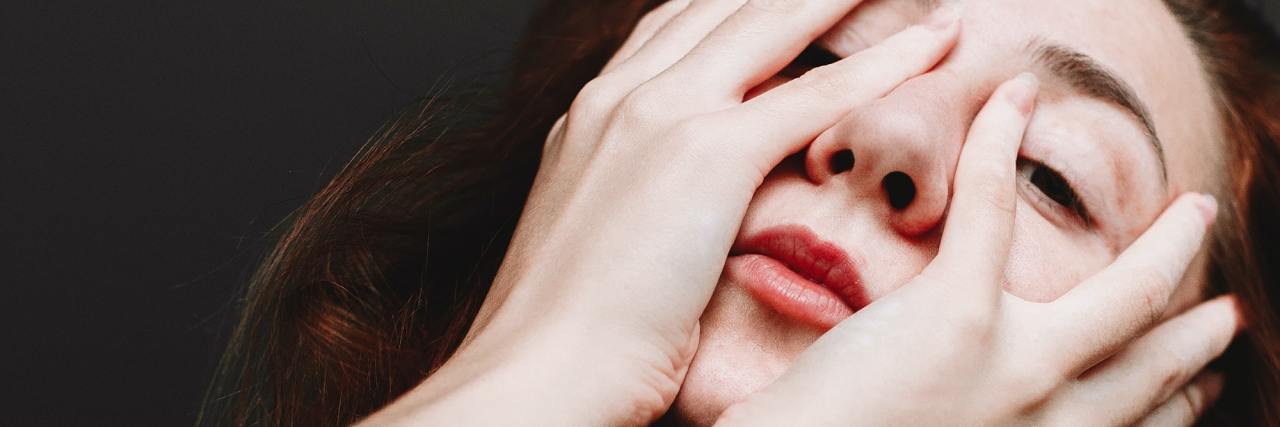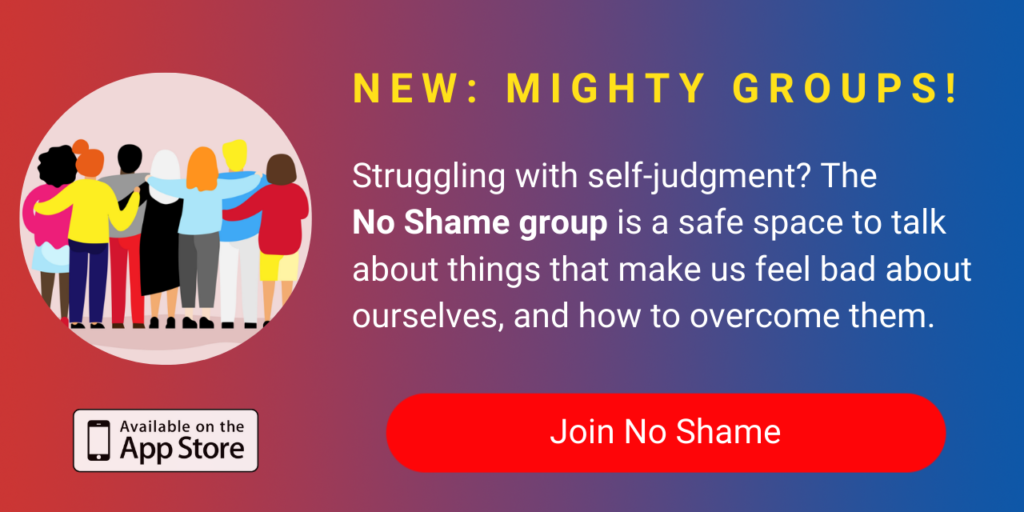You Don’t Need To Feel Ashamed of These ‘Problematic’ Mental Illness Symptoms
I am so grateful that, as a society, we are trying to tear down the stigma of mental health issues. But do you ever get the feeling that the depictions of mental illness online are a little too … pretty? We have all these images of a young woman, almost always white, crying beautiful dainty tears, and that’s supposed to be … depression?
Really?
That’s not what it looks like for me. I’m not even talking about my “ugly crying” (although I am definitely an “ugly crier”). I’m talking about problematic symptoms of mental illness that make us hard to be around. The “ugly” symptoms that make our lives harder, that make the lives of everyone around us harder, that make us well and truly hate ourselves.
What Are Problematic Symptoms of Mental Illness?
When I say “problematic” symptoms, I mean symptoms that cause real problems, for us and for those around us. Sometimes, this looks like not showering for several days, maybe even weeks, because we just don’t have the energy. Other times, this looks like lashing out, making impulsive, destructive decisions, or hurting others just to get some of the hurt out of our own heads.
Problematic symptoms are not dainty, and they can’t be easily hidden or normalized. Because they are … well, a problem.
But that doesn’t mean we have to be ashamed of them. Shame is the great silencer, it keeps us trapped in patterns that only cause us more harm. If we truly want to change our life, change our behavior, shame is never the answer.
Personally, I think the best way to start dealing with problematic symptoms of mental illness is to acknowledge their existence more often and to accept that they are part of the reality of living with mental illness. It’s not so much about saying that these symptoms aren’t our “fault;” it’s more about removing fault from the conversation. Instead, let’s focus on the pain that drives these symptoms. Not so we can dwell and ruminate, but so we can acknowledge that our pain is real, and sometimes it’s so overwhelming, we find ways to cope that hurt us in other ways.
One of my favorite mantras is this:
Forgive yourself for the ways you chose to survive.
My Experience With Problematic Symptoms of Mental Illness
I want us to talk about problematic symptoms more, but there’s a reason most of us don’t: it’s embarrassing. No one wants to talk about all of the ways their mental illness has made them into a person they don’t always like, and sometimes even hate. No one wants to talk about the symptoms that aren’t pretty or socially acceptable. No one wants to admit that their illness has caused a lot of pain for other people.
But I think the first step toward coping with and reducing these symptoms is acknowledging them. You don’t have to do it in a public way, like me, but I’ll go first, so you can see that nothing catastrophic happens when we say, “Hey, I’m deeply flawed and some of it is because of mental illness and I’m working on it.”
So, here are some ways my mental illness shows up in ways that are ugly, scary, mean and problematic:
1. Codependency.
It’s not cute to rely on someone else for your sense of self-worth, especially when that person has done nothing to make you unsure of yourself. But that’s one of my problematic symptoms. I am very problematically codependent on my husband. This means that any time we have a minor disagreement, it feels like a threat to my whole identity because who I am is so entangled in who my husband is. This sucks for me because I often find myself making myself smaller, holding back who I am to better fit with my husband, but it’s also a big problem for him. Imagine loving someone so much, but never being able to disagree with them because if you do, they’ll have a mental breakdown. How could that ever be a healthy, equitable relationship?
Yeah, it can’t be.
Sometimes that makes me feel so unbelievably shitty, and I think my husband would be so much better off with someone else, someone who can love him as himself, not just as a support crutch for their own identity.
Someone not like me.
But do you see how this shame is encouraging me to avoid the problem rather than address it? Without shame, here’s the reality of this problematic symptom: my husband loves me, and my codependency presents a challenge in our relationship.
That’s it. There’s no need to pile on layers of shame until I can’t do anything about this issue. Instead, I’m working on acknowledging it and talking with my therapist about ways I can find my own authenticity and hold space for my reality and my husband’s without feeling like my identity is crumbling.
2. Resentment.
A big part of me is still very ashamed of this symptom because I know how incredibly unfair it is. But sometimes, I find myself resenting the people around me for no reason.
Now, I want to be clear that resentment is sometimes warranted, though it’s never fun. What I’m talking about here is a feeling of resentment that stems from being frustrated that I’m the only one around me who feels so horrible all the time. I start to resent people for being healthy, I get jealous of people who have it worse than I do, and I become snippy and, honestly, nasty to the people around me.
This is not a cute or pretty symptom. It’s not OK for me to treat other poorly, but at the same time, the very nature of mental illness means that I can’t always help how I act.
So, what the hell am I supposed to do?
First, I do my best to apologize when the resentment feeling has finally passed. I try to apologize and explain what happened without excusing my behavior, but I know sometimes I fail at this. But I keep trying because my loved ones deserve a real apology despite my mental illness, and I know that.
Then I apologize to myself.
I do this because when I get this way, I tend to beat myself up with a tidal wave of shame. Why am I being such a dick? What’s wrong with me? Why would anyone want to be around someone like me? The shame goes on and on.
So when the feeling subsides, I take a moment to let myself know that the shame wasn’t correct. There are good things about me, and my flaws are not confirmation that I’m the worst person alive.
3. Absolutely zero energy.
The last problematic symptom of mental illness I’ll talk about today (believe me, there are more) is my total lack of energy. This is one of those symptoms people actually talk about … sort of. The thing is, having no energy can look almost cozy in the right situation. If it’s the weekend and I have nothing pressing to do, I can curl up with a blanket, take three or four naps and drink some cocoa.
But more often than not, life doesn’t conveniently line up with my energy levels.
Before I adjusted my medication, my energy levels were so consistently low that doing little things like cleaning the kitchen could eat up 50% of my total energy for the day. I needed a nap every single day, and nearly every task in my life felt daunting.
In real life, this looks like missing out on parties and get-togethers because I’m too exhausted, or going and yawning the whole time, desperately wishing I could go home. It looks like neglecting my personal hygiene and putting an unfair amount of the housework on my husband. It looks like more shame, because who can’t even muster up enough energy to put dishes in the dishwasher?
Like all of the other problematic symptoms in this list, my lack of energy requires a lot of forgiveness, but I’ve also recently realized that medication can be a great solution as well. If you struggle to get through every day, I hope you’ll consider talking to a psychiatrist because it has honestly changed my life.
Your Mental Illness Doesn’t Have to Be Instagram-Worthy
As we fight to reduce the stigma against mental illness, it’s tempting to believe that you have to post about it in order to break down the stigma. You have to expose all of your secrets on Instagram.
But that just isn’t true. Even this post isn’t a confessional. It’s taken me years to make peace with these problematic symptoms enough to actually talk about them. As important as it is to make mental illness more visible and less hidden, I would argue that defeating your own internalized shame is even more important.
If this is the first time you’ve felt like your problematic symptoms are … OK? Maybe not great, but not weird or shameful, then you should really subscribe to my blog, Healing Unscripted. When you enter your name and email, you get weekly updates on blog posts, the bi-weekly Validation Station email newsletter, and an awesome freebie: a cathartic swear word coloring sheet. I hope you’ll check it out!
A version of this article was previously published on the author’s blog, Healing Unscripted.
Photo by Inna Podolska on Unsplash


